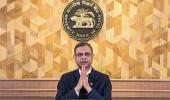The resilience of the economy and strength of domestic demand will continue to make India an engine of growth amid the rapidly evolving global trade landscape as a result of US tariffs, Finance Minister Nirmala Sitharaman said in London on Tuesday.

In an interaction entitled the ‘Opportunities and challenges for India's quest to become a developed economy by 2047' at the High Commission of India in London at the start of her first UK visit in her current Union Cabinet term, the minister asserted that the economy was well placed to capitalise on domestic efficiencies and competitiveness as it tackles global headwinds.
She also expressed her optimism over the successful conclusion of the India-UK Free Trade Agreement (FTA) negotiations “sooner rather than later”, along with a Bilateral Investment Treaty.
“The world has seen depressed growth for over several years, earlier it was low interest for long and now it's going to be low growth for long, and that's not happy news for anybody,” said Sitharaman.
“India has maintained its fastest growing economy tag continuously now for five years and we still think that momentum may moderate a bit, but it will still be India who will keep that growth… as our growth gets calibrated because of the consumption which exists domestically.
"It is backed by demand for global-standard goods and that is why globalisation since the 1990s has given India many opportunities,” she said.
“The US is the leading trade partner for India.
"So, at a time when trade is going to be influenced by tariffs, measures which the US government is taking, we still will have to make sure that the strength that India has in domestic demand as a big magnet which can attract global supplies must be sustained and boosted,” she noted.
The minister said the strength of this demand would prove attractive for foreign direct investment (FDI) and international manufacturing to supply for the domestic market and also export from India.
“We think India, and a few emerging markets, are going to be the engines of growth.
"The global depressed growth, if it has to pick up, will have to be because of these engines,” she said.
She admitted that given the global interconnectedness, the Indian economy is not isolated from the global risks and challenges arising due to geopolitical tensions, trade disruptions and financial market volatility.
“Navigating these headwinds requires strategic policy interventions with a strong emphasis on strengthening domestic capabilities and capacities.
"In this phase of a rapidly evolving global policy landscape, with a number of imponderables, the government's conviction is that the most effective path to building economic resilience is to foster domestic efficiencies and competitiveness,” she said, pointing to her recent Union Budget as an example of this approach.
During an interaction session with Lord Nicholas Stern and N K Singh – co-chairs of the London School of Economics (LSE) India Advisory Board – the minister went on to reflect upon a shift away from multilateralism towards greater bilateralism.
With reference to the India-UK bilateral ties, the minister offered some insights into the focus areas for the 13th Ministerial Economic and Financial Dialogue (EFD) scheduled for Wednesday – including closer cooperation between the financial sectors of the two countries and stronger educational ties given the National Education Policy 2020 to welcome UK universities into India.
“We will also cover mutual recognition of certain professions, which is important for both the countries and science and technology where UK holds some premier research positions and India would like to seek cooperation and collaboration,” she said.
“We will also be looking at successfully concluding the investment treaty, which has also been running parallel to the FTA negotiations,” she shared.
the minister noted: “India's negotiations with the UK on the FTA have been on for a very long time, resumed post-Brexit since February 2022.
“So, it is not as if we are rushing into an FTA because something has developed from the US.
"This was to happen a long time ago, which we now hope with the new (Labour) government showing great deal of enthusiasm to have this agreement signed, we will be in a position to sign it sooner rather than later.”
Sitharaman is in the UK at the start of a Europe tour, which will also cover Austria later this week.
While in London, she is set to hold a broad range of high-level discussions which kicked off with a meeting with Shriti Vadera, Chair of Prudential Plc, earlier on Tuesday.
“The union finance minister mentioned the growth in the insurance sector in India owing to the reforms in FDI policy, and emphasised on the need to focus on reinsurance and third party insurance in addition to health insurance and other products,” the ministry of finance said in a readout of the meeting.
The International Financial Services Centre at GIFT City was among the topics covered, with Prudential encouraged to explore deeper engagement with the ecosystem it offers, including in areas such as global reinsurance services as well considering GIFT City services for global fund management for investing in India.
Vadera informed the finance minister about the British insurance and asset management giant's upcoming venture in the health insurance space in India.











 © 2025
© 2025